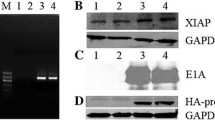Abstract
Objective
To investigate the therapeutic efficacy of adenovirus-mediated herpes simplex virus thymidine kinase (HSV-tk) gene transfer under the driving of KDR promoter (AdKDR-tk) in combination of ganciclovir (GCV) against human hepatocellular carcinoma in nude mice.
Methods
HepG2 cell line was implanted subcutaneously into 32 nude mice, which were subsequently divided into 4 groups (n=8 each group): Ganciclovir group (I), Ad group (II), AdCMV-tk/GCV group (under the driving of CMV promoter) (III) and AdKDR-tk/GCV group (IV). Then intratumoral injection of recombinant adenovirus or Ad was performed in all nude mice, and repeated 24 h later. For the following 10 d GCV was given at a dose of 100 mg/(kg·d), ip. All the treated animals were killed to evaluate the tumor weight and the histopathological changes and the microvessel density of tumors after the treatment was determined.
Results
Compared with group I, the tumor inhibitory rate was 12.3% in group III and 24.5% in group IV; the inhibition rates were significantly different between group III and IV (P<0.05). The mean MVDs in group I, II, III and IV were 37.4±8.6, 30.6±7.8, 27.6±7.1, and 10.7±4.1 (microvessels/mm2), respectively. Significant differences were found between group III and II (P<0.05), IV and II (P<0.01), and IV and III (P<0.01).
Conclusion
Intratumoral injection of AdKDR-tk results in marked inhibition of HCC growth through inhibition angiogenesis in nude mice. It may be a new treatment approach for human HCC.
Similar content being viewed by others
References
Di Bisceglie AM. Epidemiology and clinical presentation of hepatocellular carcinoma [J]. J Vasc Interv Radiol 2002; 13:S169–71.
Miao J, Chen GG, Chun SY, et al. Adenovirus-mediated tBid overexpression results in therapeutic effects on p53-resistant hepatocellular carcinoma [J]. Int J Cancer 2006; 119:1985:93.
Yang WY, Huang ZH, Lin LJ, et al. Kinase domain insert containing receptor promoter controlled suicide gene system selectively kills human umbilical vein endothelial cells [J]. World J Gastroenterol 2006;12:5331–5.
Shirakawa T, Gotoh A, Wada Y, et al. Tissue-specific promoters in gene therapy for the treatment of prostate cancer [J]. Mol Urol 2000; 4:73:82.
Saharinen P, Alotalo K. Double target for tumor mass destruction [J]. J Clin Invest 2003; 1114:1277–80.
Sassa Y, Hata Y, Aiello LP, et al. Bifunctional Properties of peroxisome proliferator-activated receptor gammal in KDR gene regulation mediated via interaction with both Sp1 and Sp3 [J]. Diabetes 2004; 53:1222–9.
Szary J, Kalita K, Przybyszewska M, et al. KDR promoter can transcriptionally target cytosine deaminase suicide gene to cancer cells of nonendothelial origin [J]. Anticancer Res 2001; 21:3471–5.
Shen BQ, Lee DY, Gerber HP, et al. Homologous up-regulation of KDR/Flk-1 receptor expression by vascular endothelial growth factor in vitrol [J]. J Biol Chem 1998; 273:29979–85.
Ido A, Uto H, Moriuchi A, et al. Gene therapy targeting for hepatocellular carcinoma: selective and enhanced suicide gene expression regulated by a hypoxia-inducible enhancer linked to a human alpha-fetoprotein promoter [J]. Cancer Res 2001; 61:3016–21.
Poon RT, Zq IO, Lau C, et al. Tumor microvessel density as a predictor of recurrence after resection of hepatocellular carcinoma: a prospective study [J]. J Clin Oncol 2002; 20:1775–85.
Zhang ZL, Liu ZS, Sun Q. Anti-tumor effect fo thalidomide and paclitaxel on hepatocellular carcinoma in nude mice [J]. Chin Med J 2005;118:1688–94.
Dutour A, Monteil J, Paraf F, et al. Endostatin cDNA/cationic liposome complexes as a promising therapy to prevent lung metastases in osteosarcoma: study in a human-like rat orthotopic tumor [J]. Mol Ther 2005; 11:311–9.
Tandle A, Blazer DG 3rd, Libutti SK. Antiangiogenic gene therapy of cancerL recent developments [J]. J Transl Med 2004; 2:22.
Ahlskog J, Paganelli G, Neri D. Vascular tumor targeting [J]. Q J Nucl Med Mol Imaging 2006; 50:296–309.
Wachsberger PR, Burd R, Marero N, et al. Effect of the tumor vascular-damaging agent, ZD6126, on the radioresponse of U87 glioblastoma [J]. Clin Cancer Res 2005; 11:835–42.
Poon RT, Lau CP, Cheung ST, et al. Quantitative correlation of serum levels and tumor expression of vascular endothelial growth factor in patients with hepatocellular carcinoma [J]. Cancer Res 2003; 63:3121–6.
Ribatti D, Vacca A, Nico B, et al. Angiogenesis and anti-angiogenesis in hepatocellular carcinoma [J]. Cancer Treat Rev 2006; 32:437–44.
Patterson C, Wu Y, Lee ME, et al. Nuclear protein interactions with the human KDR/flk-1 promoter in vivo. Regulation of Spl binding is associated with cell type-specific expression [J]. J Biol Chem 1997; 272:8410–6.
Pastorino F, Brignole C, Marimpietri D, et al. Vascular damage and anti-angiogenic effects of tumor vessel-targeted liposomal chemotherapy [J]. Cancer Res 2003; 63:7400–9.
Szary J, Kalita K, Przybyszewska M, et al. KDR promoter can transcriptionally target cytosine deaminase suicide gene to cancer cells of nonendothelial origin [J]. Anticancer Res 2001; 21:3471–5.
Jaggar RT, Chan HY, Harris AL, et al. Endothelial cell-specific expression of tumor necrosis factor-alpha from the KDR or E-selectin promoters following retroviral delivery [J]. Hum Gene Ther 1997; 8:2239–47.
Mavria G, Harrington KJ, Marshall CJ, et al. In vivo efficacy of HSV-TK transcriptionally targeted to the tumour vasculature is augmented by combination with cytotoxic chemotherapy [J]. J Gene Med 2005; 7:263–75.
Tan R, Li C, Ma L. A novel and simple method for construction of recombinant adenoviruses [J]. Nucleic Acids Res 2006; 34:e89.
Mullan B, Dugue C, Moutard V, et al. Robust functional gene validation by adenoviral vectors: one-step Escherichia coli-derived recombinant adenoviral genome construction [J]. Gene Ther 2004; 11:1599–1605.
Liu XP, Li BJ, Zhang C. Construction and identification of recombinant vectors carrying herpes simplex virus thymidine kinase genes expressed in vascular endothelial cells [J]. Ai Zheng (Chin) 2006; 25:179–84.
Author information
Authors and Affiliations
Corresponding author
Additional information
This project was supported by the National Natural Science Foundation of China (No. 30371386) and by a grant from the Natural Science Foundation of Guangdong Province (No. 31010).
Rights and permissions
About this article
Cite this article
Li, Bj., Zhang, C., Yi, Yx. et al. Adenovirus-mediated herpes simplex virus thymidine kinase gene transfer driver by KDR promoter in treatment of experimental human hepatocelLular carcinoma in nude mice. Chin. J. Cancer Res. 19, 22–26 (2007). https://doi.org/10.1007/s11670-007-0022-8
Received:
Accepted:
Issue Date:
DOI: https://doi.org/10.1007/s11670-007-0022-8




